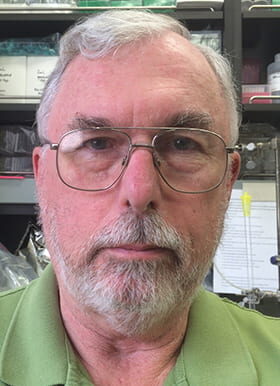
Research Interests
Based upon a history of renal disease investigations and the interests within the Kharasch lab of Anesthesiology, Dr. Morrissey’s major interest is to identify clinically useful urinary biomarkers of kidney disease. The focus is on the early diagnosis of kidney cancer and predicting predisposition to acute kidney injury in patients within Intensive Care Units.
Renal cancer accounts for about three percent of adult malignancies but is typically silent and frequently fatal. Early diagnosis, triggering surgical excision, is usually curative. Physical signs and symptoms occur late, and by the time renal cancer is consequently diagnosed, it has usually metastasized to lymph nodes or adjacent organs and advanced beyond a therapeutic stage with minimal chance for survival. In a recent publication, we have shown that aquaporin 1 (AQP1) and adipophilin (ADFP) are significantly increased in urinary exosomes of patients with kidney cancer thus providing the first sensitive and specific biomarkers of this disease. Therefore, it is further hypothesized that urine exosomes, vesicular structures released into the urine by all parts of the nephron, will be a discovery tool for additional novel biomarker proteins and will serve as a non-invasive biopsy of kidney cell oncogenesis and metastasis. The overall objective is to identify proteins in the urine exosomes of kidney cancer patients which are unique to this disease, and which can be developed into a diagnostic test to screen whole urine to detect kidney cancer at an early curable stage, to follow patients post-operatively for recurrence and follow patients in treatment for metastatic disease. Unique up- or down-regulated proteins will be identified by unbiased top-down and supervised bottom-up mass spectral (LC/MS/MS) and Western blot proteomic analysis of the urine exosomal proteins. Once proteins are identified in training sets of patients by mass spectrometry, precise but economical ELISA-based immunologic assays that give same-day results will be developed, for protein quantification in whole urine and serum in validation sets of patients. Overall, this study seeks to improve the diagnosis of kidney cancer to a stage early enough to allow a significant chance for cure while maximizing existing kidney function and identify future molecular targets for selective disease intervention.
Acute renal failure occurs in a significant number of patients in hospital Intensive Care Units and is preceded by acute renal injury which has been traditionally diagnosed as an increase in the serum creatinine level. This increase in creatinine, however, takes place 1-3 days after the actual injury and delays the implementation of effective treatments. There is a need to identify novel predictive biomarkers of kidney injury and renal repair equivalent to the serum troponin levels that have revolutionized cardiac diagnosis and care. Identification of non-invasively acquired
urinary biomarkers will help spare patients possible renal biopsies for disease diagnosis and remove uncertainties if the biopsy sample missed the focal disease. The unmet need is a simple test to determine a patient’s predisposition to develop and then to diagnose acute kidney injury earlier than changes in urine output and/or serum creatinine thus positively altering their course of treatment. We will use proteomic techniques, described above, to identify candidate biomarker proteins in the urine exosomes of patients which are pathogneumonic of sensitization to acute kidney injury and the injury itself and differentiate these proteins from patients who do not develop such kidney injury.
Publications
A comprehensive list of Dr. Morrissey’s publications can be found by visiting the link below.
Other Positions/Roles
- 2002-present: Editorial Board, American Journal of Physiology-Renal Physiology
- 2006-present: Editorial Board, Kidney International
- 2007: Special Emphasis Review Panel, NIDDK, July
- 2008: Special Emphasis Review Panel, NIDDK, March
- 2009-present: Editorial Board, Kidney International
- 2018: International Thesis Reviewer, The University of Adelaide, Adelaide Graduate Centre
- 2019: NCI UH2/UH3 Study Section Assay Validation of High Quality Markers October
- 2019: CDMRP FY19 KCRP Study Section December
- 2020: CDMRP FY20 KCRP ConceptA Study Section October
- 2020: CDMRP FY20 KCRP Career Development Study Section November
- 2021-present: Chair Institutional Conflict of Interest Committee, Washington University in St. Louis